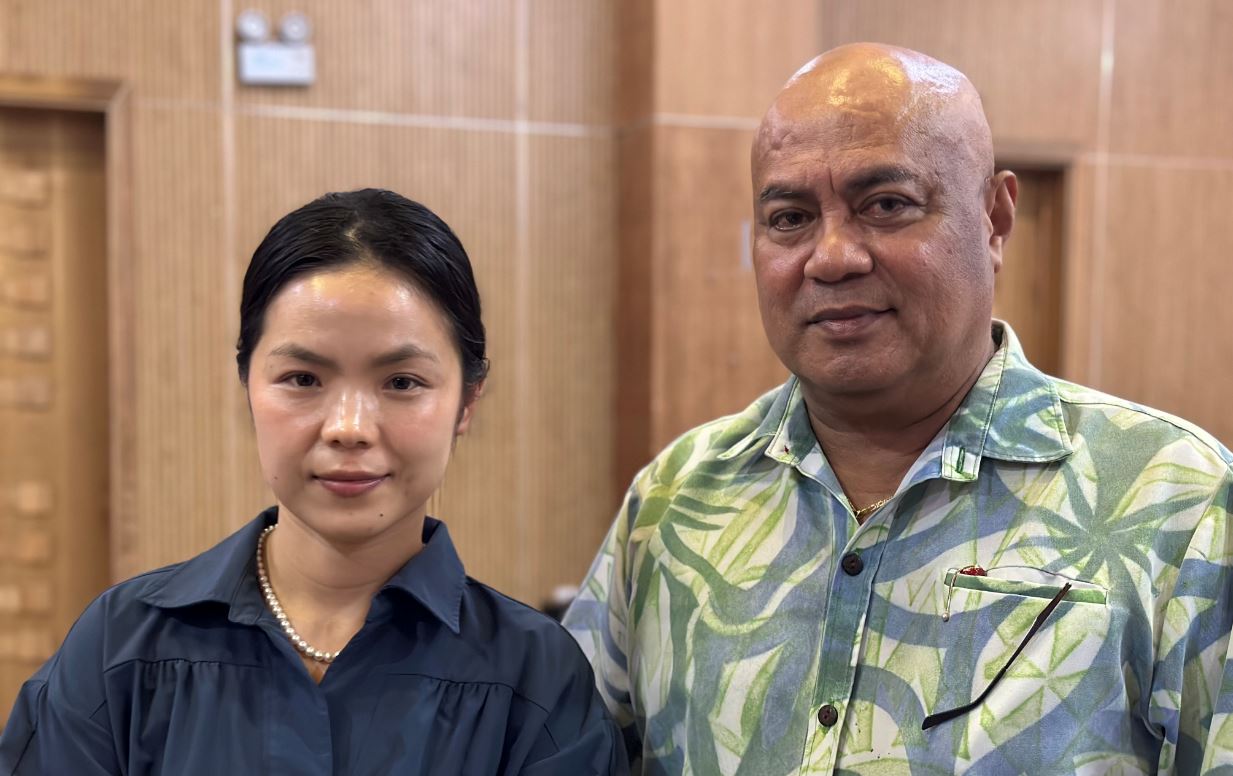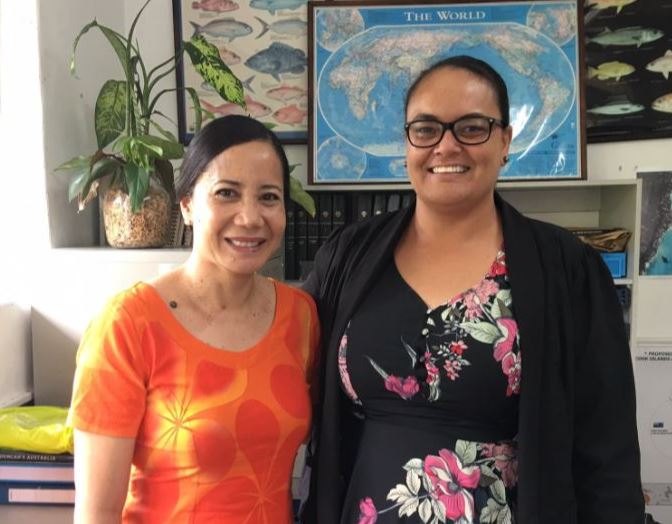Tuna industry calls for harvest strategy – ‘Keep stocks in the green’
Saturday 3 December 2022 | Written by Caleb Fotheringham | Published in Environment, National, Regional

WCPFC chair Jung-re Riley Kim and outgoing executive director Feleti Penitala Teo. 22120241
The tuna industry’s major players are calling for a more science-based approach to improve decision-making on management and conservation for skipjack tuna fisheries.
One of the messages inside the Global Tuna Alliance’s fortune cookies that were handed out at the Western and Central Pacific Fisheries Commission (WCPFC) meeting in Da Nang, Vietnam this week read: “The road to success is paved by having a harvest strategy for skipjack.”
On the other side of the paper fortune is the Global Tuna Alliance’s tagline for this year’s meeting – “Keep stocks in the green” – a reference to the healthy fish stocks the region boasts.
The WCPFC is the governing body that looks after the tuna stocks in the Western and Central Pacific Ocean which includes Cook Islands waters.
The Cook Islands is also one of 26 member countries that are part of the Commission and has delegates at the conference.
The Global Tuna Alliance is a group of independent seafood companies interested in tuna sustainability.
According to its executive director, Tom Pickerell, 32 per cent of the world’s tuna passes through the Global Tuna Alliance’s members and they’re “absolutely unanimous” in wanting harvest strategies implemented for all the stocks in the region.
“That is our primary ask,” Pickerell says, “it’s something that we are fully aligned with the NGO community on, so you have the NGOs, and you have the market calling for this thing.”
A management procedure is part of a harvest strategy and is a pre-agreed framework for making fisheries decisions, akin to making rules before a sports game is played.
The idea is to minimise political negotiations and leave the decision-making to science which will set the level of fishing. It’s a major focal point for the WCPFC meeting this year with multiple stakeholders expressing their desire to have it adopted for skipjack.
Pickerell says a management procedure makes overfishing stocks unlikely.
“It has the boundaries and it avoids the political horse-trading that you see in the room today,” he says on the fourth day of the meeting.
“It’s just a cornerstone of fisheries management. It’s an absolute no brainer.”
Pickerell says harvest strategies also means security of supply for companies.
“Tuna is a big, big seller and these companies want to continue selling it. One way to do that is to have really well managed stocks, and by having really well managed stocks, you don’t get that fluctuation.
“One year, you may get loads (of tuna) dumped on the market and the price goes down, if there’s less because the stock gets overfished, then the price goes up. So they want stability as do the fishermen as do the communities.”
New England Seafood International brings in seafood from all over the world and processes it in the United Kingdom and sends it to large UK retailers.
Head of sustainability at New England Seafood International, Ruth Hoban says the company’s key interest is in yellowfin tuna and wants a harvest strategy for the fish.
“Sustainability is at the core of New England Seafood and although the stocks are green, which is brilliant, we do see the risk that without proper management that may not be the case for the future to come and we want to continue to buy yellowfin tuna, buy albacore tuna, and then sell it into retailers for many, many years,” Hoban says.

“We believe that harvest strategies are the key way to do that moving forward.”
Secretary of the Ministry of Marine Resources and leading the Cook Islands delegation in Da Nang, Pamela Maru says she is wanting to see a management procedure adopted this year.
Maru says she also wants revisions to the harvest strategy measure to meet requirements for fleets and fisheries certified under the marine stewardship council.
Fish and seafood with the blue Marine Stewardship Council (MSC) means it’s certified as fishing sustainably according to MSC.
Maru’s comment follows the Council’s threat that 33 certified tuna fisheries in the region may lose certification if the Commission fails to adopt a management measure for skipjack.
WCPFC chair Jung-re Riley Kim says good progress was being made and was hopeful a management procedure for skipjack would be adopted at this year’s meeting.
“We are aiming at adopting it at the end of the week,” says Jung-re before the meeting concluded last night.
“Once we adopt a management procedure for skipjack, that will be implemented but how they will be implemented depends on the data and the Commission members.”
MMR’s Maru says strengthening the management of South Pacific albacore is also priority for the Cook Islands, and the southern longline fishery more broadly.
“Whilst this stock is biologically healthy, the economic viability of the longline albacore fishery requires attention. This is of particularly importance for the domestic fleets (such as the small scale longliners based out of Avatiu) of Pacific Islands nations.
“Under discussion is a multiyear workplan that focuses on progress towards the development of harvest strategies for South Pacific albacore, with elements to progress determination of management objectives, a target reference point, development of management procedures, and the development of an allocation framework in 2023. These are key work areas the Cook Islands are wanting to see as an outcome of WCPFC19. This in turn should assist with work to improve the current conservation and management measure.”
Outgoing executive director, Feleti Teo says in the past the Commission has had a reactionary management approach.
“Once a tuna stock reaches a critical status the Commission reacts to put in place measures that addresses that critical situation, which is always difficult because countries have their own commercial interest,” Teo says.
“It’s very difficult to negotiate measures in response to a crisis. What the management strategy approach brings to the fore is that the Commission will negotiate rules in advance of a stock reaching a crisis.
“This is an entirely new approach to fisheries management and one that will hopefully take the politics out of fisheries management.”
Teo says the “game plan” was to eventually have a harvest strategy for all highly commercialised tuna stock, not just skipjack.
The director general of the Pacific Islands Forum Fisheries Agency (FFA), Manumatavai Tupou-Roosen was optimistic that a skipjack management procedure would be approved by the end of the week.
According to Tupou-Roosen, a management procedure is an important first step in the harvest strategy approach.
However, there has been criticism from environmental NGOs that the FFA does not want to be fully committed to the management procedure.

Glen Holmes from Pew Charitable Trusts previously told Cook Islands News that the FFA’s position was that they wanted to “tick a box” but “don’t want to change anything”.
But, Tupou-Roosen says the FFA remains committed to a harvest strategy approach.
“We just see that we need to take certain steps as part of that,” she says.
“The development of a harvest strategy takes a number of years. It’s not something we can do overnight and we recognise that and there are steps towards its full development, but, there are a lot of unknowns and we don’t want to dive into this space, put in a permanent measure, and then find out later that it'’ harder to amend.
“The approach a few members are taking is putting it in as an interim measure and as we implement it, take into account the lessons learned and continue to refine towards developing a fully-fledged harvest strategy.”
A decision on if the WCPFC management procedure will be adopted was expected to be made last night on the final day of the conference.
- Caleb Fotheringham in Da Nang, Vietnam. Fotheringham’s trip was made possible by The Ocean Foundation.

















































